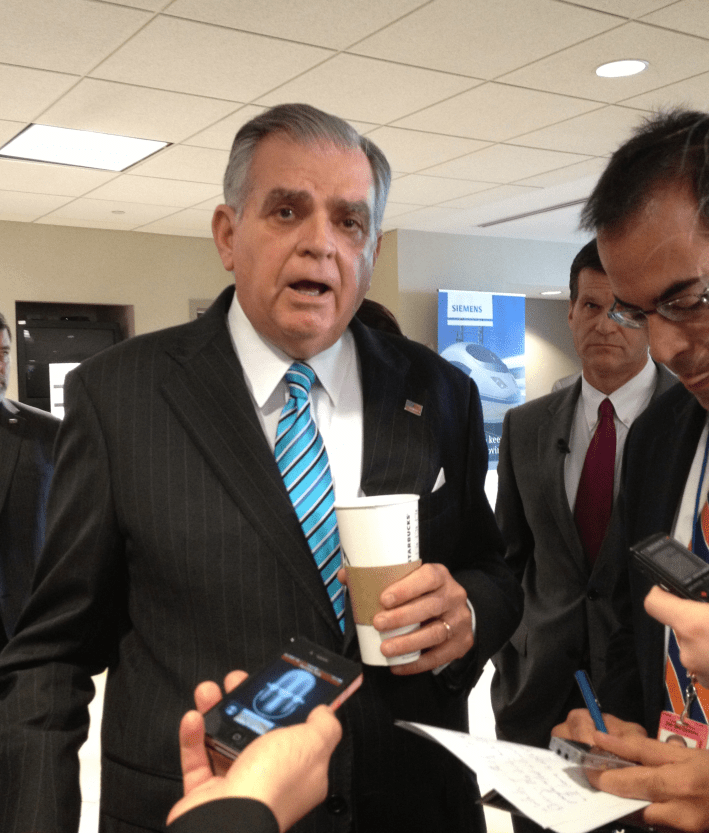Rep. John Mica (R-FL) no longer chairs the House Transportation Committee, but that doesn’t mean he’s eased up on his crusade against Amtrak. Calling the company a “Soviet style monopoly,” Mica used his afternoon address to the U.S. High Speed Rail Association to announce his plan to revive his despised and defeated measure to privatize parts of Amtrak.

Mica plans to introduce legislation to end Amtrak’s “monopoly” by allowing “open competition to provide intercity passenger and high-speed rail service.”
Of course, high-speed rail in California is open for bids from private, mostly foreign, firms, and many have expressed interest. Fully private entities are moving forward with rail projects in Florida and Texas. Amtrak simply doesn’t have the stranglehold on rail in America that Mica tries to convey. And in the sense that Amtrak does have a broad network of lines, it’s in large part because it was created by Congress and is partially funded by taxpayers with a mandate to provide mobility services to the country.
To illustrate the land of milk and honey that awaits rail privatization, Mica cited the European Union’s decision to end state rail monopolies. Perhaps he isn't up to speed on the latest news: The European Commission planned last month to break up the monopolies and open the rail system to free market competition but took a step back from that two weeks later due to opposition, favoring instead a proposal that will allow Germany and France to keep their state-dominated systems. Meanwhile, rail privatization in the UK has let to a tripling of fare prices and plummeting investor confidence.
Earlier in the day, Transportation Secretary Ray LaHood also had an anecdote from Europe and Asia. He’s toured 18 countries’ high-speed rail systems during his tenure as secretary. “The common thread in every country was the idea that unless the national government makes the investment in high-speed rail, it will not happen,” he said.
Mica hopes to include his privatization proposal in the Passenger Rail Investment and Improvement Act reauthorization this year. The last time he tried to include a similar idea in the surface transportation reauthorization, the proposal was so widely panned he had to retract it. Mica now has no leadership post within the committee. He is the senior member of the Rail Subcommittee but not the chair or the vice chair.
Mica also took the opportunity to castigate President Obama for promoting a vision of high-speed rail access for 80 percent of the nation in 25 years, saying the administration has “wasted” $10 billion on high-speed rail.
Participants said the response to Mica was “muted” though you could see the “displeasure” and “disapproval” on people’s faces when he slammed Amtrak. The same group had awarded Amtrak CEO Joe Boardman a Heroes of High-Speed Rail award just a few hours before. USHSR President Andy Kunz presented that award with a jab at lawmakers like Mica, saying, “Amtrak never has enough money, is always under scrutiny from Congress and is advancing high-speed rail in the middle of all that." Amtrak’s success with Boardman at the helm, Kunz said, has been a “double amazing job.”
Boardman also made an oblique criticism of Mica’s constant hounding, saying, “Amtrak is not about the price of hamburgers or even exclusively about high-speed rail. It’s about connecting scattered families.”
Boardman was also skeptical that private investors will swoop in and create high-speed rail from scratch. “Congress needs to understand that the private sector is willing to put in 10, 15 percent -- maybe a little bit more -- of the investments in the kinds of things that we’re taking about,” he said. “That’s about it.”
The conference featured much talk of “detractors” – people like Mica who try to tear down the progress being made on high- and higher-speed rail.
“Do not be dissuaded by a few detractors,” LaHood exhorted the audience in the morning. “Do not be dissuaded by people without a transportation vision.”
One by one, the speakers talked to the assembled crowd as the vanguard of a movement whose time is coming, visionaries still confronting those stuck in the past.
“You talk about the naysayers,” said FRA Administrator Joe Szabo. “If you review the history you’ll see that every single megaproject – not just in the history of the U.S. but actually globally around the world – every single megaproject ever has had its detractors.”
John Mica likely would consider himself one of the catalysts of change. But it’s not the kind of change his audience was looking for.





